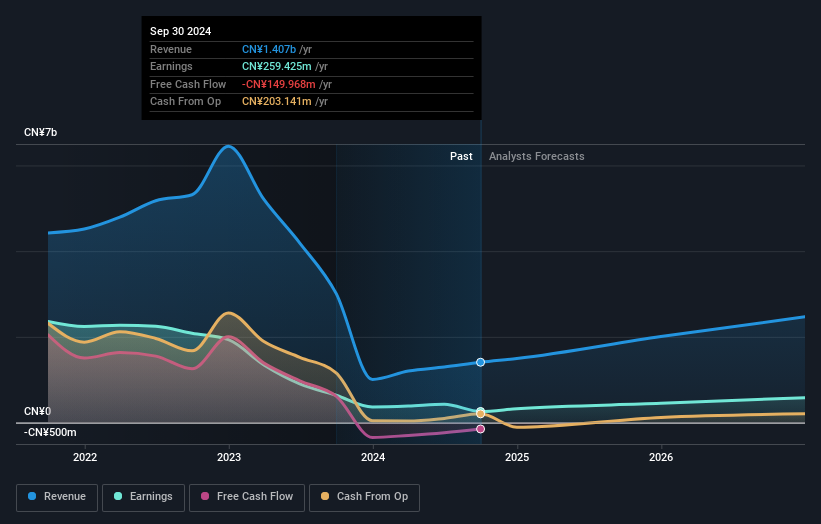- China
- /
- Medical Equipment
- /
- SHSE:688289
Sansure Biotech Inc. (SHSE:688289) CEO Lizhong Dai, the company's largest shareholder sees 4.3% reduction in holdings value

Key Insights
- Significant insider control over Sansure Biotech implies vested interests in company growth
- 51% of the business is held by the top 5 shareholders
- Institutional ownership in Sansure Biotech is 13%
To get a sense of who is truly in control of Sansure Biotech Inc. (SHSE:688289), it is important to understand the ownership structure of the business. The group holding the most number of shares in the company, around 42% to be precise, is individual insiders. In other words, the group stands to gain the most (or lose the most) from their investment into the company.
And following last week's 4.3% decline in share price, insiders suffered the most losses.
Let's delve deeper into each type of owner of Sansure Biotech, beginning with the chart below.
View our latest analysis for Sansure Biotech

What Does The Institutional Ownership Tell Us About Sansure Biotech?
Many institutions measure their performance against an index that approximates the local market. So they usually pay more attention to companies that are included in major indices.
As you can see, institutional investors have a fair amount of stake in Sansure Biotech. This suggests some credibility amongst professional investors. But we can't rely on that fact alone since institutions make bad investments sometimes, just like everyone does. When multiple institutions own a stock, there's always a risk that they are in a 'crowded trade'. When such a trade goes wrong, multiple parties may compete to sell stock fast. This risk is higher in a company without a history of growth. You can see Sansure Biotech's historic earnings and revenue below, but keep in mind there's always more to the story.

We note that hedge funds don't have a meaningful investment in Sansure Biotech. With a 33% stake, CEO Lizhong Dai is the largest shareholder. Meanwhile, the second and third largest shareholders, hold 6.5% and 5.7%, of the shares outstanding, respectively.
Our research also brought to light the fact that roughly 51% of the company is controlled by the top 5 shareholders suggesting that these owners wield significant influence on the business.
While studying institutional ownership for a company can add value to your research, it is also a good practice to research analyst recommendations to get a deeper understand of a stock's expected performance. While there is some analyst coverage, the company is probably not widely covered. So it could gain more attention, down the track.
Insider Ownership Of Sansure Biotech
While the precise definition of an insider can be subjective, almost everyone considers board members to be insiders. Management ultimately answers to the board. However, it is not uncommon for managers to be executive board members, especially if they are a founder or the CEO.
Insider ownership is positive when it signals leadership are thinking like the true owners of the company. However, high insider ownership can also give immense power to a small group within the company. This can be negative in some circumstances.
It seems insiders own a significant proportion of Sansure Biotech Inc.. It is very interesting to see that insiders have a meaningful CN¥5.4b stake in this CN¥13b business. Most would say this shows a good degree of alignment with shareholders, especially in a company of this size. You can click here to see if those insiders have been buying or selling.
General Public Ownership
With a 35% ownership, the general public, mostly comprising of individual investors, have some degree of sway over Sansure Biotech. While this group can't necessarily call the shots, it can certainly have a real influence on how the company is run.
Private Company Ownership
It seems that Private Companies own 9.1%, of the Sansure Biotech stock. It might be worth looking deeper into this. If related parties, such as insiders, have an interest in one of these private companies, that should be disclosed in the annual report. Private companies may also have a strategic interest in the company.
Next Steps:
It's always worth thinking about the different groups who own shares in a company. But to understand Sansure Biotech better, we need to consider many other factors. Consider for instance, the ever-present spectre of investment risk. We've identified 2 warning signs with Sansure Biotech (at least 1 which can't be ignored) , and understanding them should be part of your investment process.
If you would prefer discover what analysts are predicting in terms of future growth, do not miss this free report on analyst forecasts.
NB: Figures in this article are calculated using data from the last twelve months, which refer to the 12-month period ending on the last date of the month the financial statement is dated. This may not be consistent with full year annual report figures.
New: Manage All Your Stock Portfolios in One Place
We've created the ultimate portfolio companion for stock investors, and it's free.
• Connect an unlimited number of Portfolios and see your total in one currency
• Be alerted to new Warning Signs or Risks via email or mobile
• Track the Fair Value of your stocks
Have feedback on this article? Concerned about the content? Get in touch with us directly. Alternatively, email editorial-team (at) simplywallst.com.
This article by Simply Wall St is general in nature. We provide commentary based on historical data and analyst forecasts only using an unbiased methodology and our articles are not intended to be financial advice. It does not constitute a recommendation to buy or sell any stock, and does not take account of your objectives, or your financial situation. We aim to bring you long-term focused analysis driven by fundamental data. Note that our analysis may not factor in the latest price-sensitive company announcements or qualitative material. Simply Wall St has no position in any stocks mentioned.
About SHSE:688289
Sansure Biotech
Engages in the research and development, production, and sale of in vitro diagnostic reagents and instruments in China.
High growth potential with excellent balance sheet.


